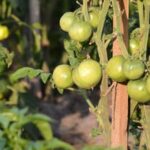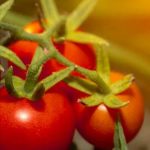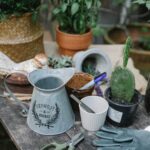Container gardening has become increasingly popular for growing vegetables, especially for those with limited outdoor space. One crucial aspect of successful container gardening is the choice of soil mix used to nurture your plants. The right container gardening soil mix for vegetables can make all the difference in achieving a bountiful harvest.
Whether you’re a seasoned gardener or just starting out, container gardening provides numerous benefits. It allows you to grow vegetables in small spaces such as balconies, patios, or even windowsills. Not only does it offer flexibility and convenience, but it also minimizes weed growth and reduces the risk of soil-borne diseases. By understanding the importance of soil mix in container gardening, you can set yourself up for a thriving vegetable garden.
When it comes to choosing the right soil mix for your vegetable containers, there are several factors to consider. From drainage and moisture retention to nutrient content and pH levels, each component plays a vital role in providing optimal conditions for plant growth. By exploring the benefits of container gardening and understanding how soil mix contributes to its success, you can create an ideal environment for your vegetables to flourish.
Choosing the Right Container
When it comes to choosing the right container for your vegetable garden, there are several factors to consider in order to ensure a successful harvest. The type of container you select can have a significant impact on the growth and health of your vegetables, so making an informed decision is crucial. Here are some key factors to keep in mind when choosing containers for your vegetable garden:
Material
The material of the container plays a vital role in maintaining the proper environment for your vegetables. Different materials such as plastic, terracotta, wood, or fabric pots all have their advantages and disadvantages. Plastic containers are lightweight and retain moisture well, but they can heat up quickly in direct sunlight. Terracotta pots are breathable and aesthetically pleasing, but they tend to dry out faster. Choose a material that suits the needs of the specific vegetables you plan to grow.
Size
The size of the container is another important factor to consider. Larger containers generally provide more space for root growth and allow for better retention of water and nutrients. However, smaller containers can be suitable for smaller vegetables or herbs with shallow root systems. Consider the mature size of the vegetables you intend to grow and choose a container that provides ample room for growth.
Drainage
Proper drainage is essential for preventing waterlogged soil, which can lead to root rot and other issues. Make sure that your chosen containers have adequate drainage holes at the bottom to allow excess water to escape. Elevating the containers slightly off the ground can also help improve drainage. Additionally, using saucers or trays underneath the pots can catch excess water while still allowing proper drainage.
By carefully considering these factors when choosing containers for your vegetable garden, you can create an optimal environment for your plants to thrive. Selecting the right containers will set a solid foundation for successful container gardening with a suitable soil mix tailored specifically for growing vegetables effectively.
Understanding the Importance of Soil Mix in Container Gardening for Vegetables
Container gardening for vegetables is a popular and convenient way to grow your own fresh produce, especially for those with limited space or poor soil conditions. One of the key factors that contribute to the success of a vegetable garden in containers is the soil mix used. The right container gardening soil mix for vegetables can make all the difference in the health and productivity of your plants.
When it comes to choosing a soil mix for your vegetable containers, there are several important components to consider. A good blend will provide proper drainage, aeration, and nutrients necessary for healthy plant growth. Here are some key components that should be included in an ideal container gardening soil mix for vegetables:
- Peat moss: Retains moisture while also improving drainage
- Perlite or vermiculite: Helps with aeration and prevents compacting of the soil
- Compost: Adds essential nutrients for plant growth
- Sand: Improves drainage in heavier soils
By incorporating these components into your container gardening soil mix for vegetables, you can create an environment that promotes strong root development and overall plant health. Remember to adjust the proportions based on the specific needs of the vegetables you plan to grow.
In addition to choosing the right components, it’s also important to ensure proper mixing of the soil before planting. Thoroughly combine all ingredients together to create a uniform blend that will support optimal plant growth. With the right container gardening soil mix for vegetables, you’ll set yourself up for a successful harvest season ahead.
Components of an Ideal Container Gardening Soil Mix for Vegetables
When it comes to container gardening for vegetables, the right soil mix plays a crucial role in the success of your garden. Using the correct components in your soil mix can provide essential nutrients, proper drainage, and adequate support for your vegetable plants. Here are some key components to consider when creating an ideal container gardening soil mix for vegetables:
- Peat Moss: Peat moss is an excellent organic material that helps retain moisture in the soil mix while also improving aeration. It is lightweight and holds onto nutrients well, making it a great addition to your container gardening soil mix.
- Perlite: Perlite is a volcanic rock material that aids in keeping the soil loose and well-draining. It prevents compacting of the soil, ensuring that air can circulate freely around the roots of your vegetable plants.
- Compost: Adding compost to your soil mix provides essential nutrients for your vegetables to thrive. Compost helps improve soil structure, fertility, and microbial activity, creating a healthy environment for plant growth.
In addition to these key components, you may also consider including vermiculite, coconut coir, or sand in your container gardening soil mix for vegetables. Each of these ingredients offers unique benefits that contribute to the overall health and productivity of your vegetable garden. By carefully selecting and combining these components based on their specific properties and advantages, you can create an ideal soil mix tailored to meet the needs of your vegetable plants.
Making Your Own DIY Soil Mix
When it comes to container gardening for vegetables, one of the most critical factors for success is the soil mix used. While pre-made mixes are readily available in stores, making your own DIY soil mix can be a cost-effective and customized solution for your vegetable garden. By creating your own blend, you have more control over the components and can tailor it to suit the specific needs of the vegetables you are growing.
A good container gardening soil mix for vegetables should provide proper drainage while retaining enough moisture, offer adequate nutrients for plant growth, and maintain good aeration for healthy root development. A common DIY recipe includes a combination of peat moss or coconut coir for moisture retention, perlite or vermiculite for drainage, and compost or organic matter for nutrients. These elements work together to create a balanced environment for your plants to thrive.
To ensure the success of your vegetable garden using a DIY soil mix, it is essential to use high-quality ingredients that are free from pests, diseases, or chemical residues. Additionally, regular monitoring of the moisture levels and nutrient content in the soil will help you make any necessary adjustments throughout the growing season. With proper care and attention to detail, your homemade container gardening soil mix can contribute significantly to the health and productivity of your vegetable plants.
| Aspect | Importance |
|---|---|
| Proper Drainage | Prevents waterlogging and root rot |
| Moisture Retention | Ensures plants have access to water during dry periods |
| Nutrient Content | Provides essential elements for plant growth and productivity |
Best Practices for Planting Vegetables in Containers With the Right Soil
Planting vegetables in containers can be a rewarding experience, especially when you have the right soil mix to support the growth of your plants. Whether you are new to container gardening or are looking to improve your current setup, following some best practices can help you achieve a successful vegetable garden on your balcony, patio, or even indoors.
Choosing the Right Containers
When planting vegetables in containers, it is essential to select the right size and material for your pots. The container should have proper drainage holes to prevent waterlogging, which can lead to root rot. Additionally, consider the size of the plant you are growing and choose a container that allows enough space for root development. Opt for containers made of materials like plastic, ceramic, or wood that are durable and suitable for outdoor use.
Selecting the Ideal Soil Mix
The success of your vegetable garden in containers heavily relies on using the correct soil mix. A well-draining soil mix is crucial for healthy plant growth since it ensures proper water retention and aeration for roots. Consider using a combination of peat moss, perlite, vermiculite, and compost to create a nutrient-rich mix that promotes strong root development and overall plant health. Remember not to use garden soil alone as it may compact too much in containers.
Planting Techniques
When planting vegetables in containers with the right soil mix, consider vertical spacing to maximize your space effectively. Place taller plants at the center or back of the container with trailing or shorter varieties around them. Ensure each plant has enough space by following recommended spacing guidelines provided on seed packets or plant tags. Water your plants thoroughly after planting to settle the soil mix around roots and provide essential hydration for new growth.
By following these best practices when planting vegetables in containers with the appropriate soil mix, you can create a thriving garden full of fresh produce all season long. Remember to regularly monitor your plants’ growth, check moisture levels in the soil, and adjust watering as needed to keep your vegetable garden healthy and productive. With dedication and care, you can enjoy a bountiful harvest from your container garden successfully.
Maintaining and Caring for Your Vegetable Garden in Containers
Container gardening is a fantastic way to grow vegetables even in limited spaces. Once you have set up your vegetable garden in containers with the right soil mix, it is essential to maintain and care for your plants properly to ensure a bountiful harvest. Regular maintenance and proper care will help your vegetables thrive and stay healthy throughout their growing season.
One crucial aspect of maintaining container gardens is watering. Vegetables grown in containers often require more frequent watering than those planted in the ground. It is essential to check the moisture level of the soil regularly to ensure that it does not dry out completely. Using a high-quality potting mix that retains moisture can help reduce the frequency of watering but always monitor your plants closely.
In addition to watering, feeding your container garden with appropriate fertilizer is key to supporting healthy growth and abundant harvests. Choose a balanced fertilizer specifically formulated for vegetables and follow the instructions on the packaging for application rates. Feeding your plants regularly with a suitable fertilizer will provide them with essential nutrients for strong roots, robust foliage, and high yields. Remember to fertilize according to the needs of each vegetable variety you are growing in your containers.
| Benefit | Tips |
|---|---|
| Regular maintenance | Check moisture levels frequently |
| Watering | Use quality potting mix for moisture retention |
| Fertilizing | Choose balanced fertilizer for vegetables |
Troubleshooting Common Soil-Related Issues in Container Gardening for Vegetables
Container gardening for vegetables can be a rewarding and convenient way to grow your own produce, but it does come with its own set of challenges. One common issue that many gardeners face is soil-related problems. It’s essential to troubleshoot these issues promptly to ensure the health and productivity of your vegetable plants.
One frequent problem that can arise in container gardening for vegetables is poor drainage. If excess water cannot drain properly from the container, it can lead to root rot and other issues. To address this problem, ensure that your containers have sufficient drainage holes at the bottom. You can also consider adding materials like perlite or coarse sand to the soil mix to improve drainage.
Another common soil-related issue in container gardening for vegetables is nutrient deficiency. Since container plants rely solely on the nutrients present in their growing medium, it’s crucial to provide them with a well-balanced soil mix. Incorporating organic matter like compost or aged manure into your soil mix can help replenish essential nutrients and promote healthy plant growth. Regularly feeding your vegetable plants with a balanced fertilizer designed for containers can also help prevent nutrient deficiencies.
Lastly, compacted soil can hinder root development and water penetration in container-grown vegetables. To combat this issue, regularly aerate the soil by gently loosening it with a hand trowel or fork. You can also top-dress the container with fresh potting mix periodically to refresh the nutrients available to your plants. By addressing these common soil-related issues promptly, you can create an optimal growing environment for your vegetable garden in containers and ensure a bountiful harvest.
Conclusion
In conclusion, the key to successful container gardening for vegetables lies in nurturing your plants with the perfect soil mix. By understanding the importance of soil composition and selecting the right components for your mix, you can provide your vegetables with a healthy environment to thrive in. Choosing the right container, whether it’s size, material, or drainage capabilities, is essential for creating a successful vegetable garden in containers.
Creating your own DIY soil mix can be a rewarding experience and allows you to customize the blend according to the specific needs of your vegetables. By following best practices for planting and maintaining your container garden, such as proper watering and fertilizing techniques, you can ensure that your vegetables are getting all the nutrients they need to grow healthy and strong.
Lastly, by recognizing and addressing common soil-related issues that may arise in container gardening for vegetables, such as compaction or nutrient deficiencies, you can prevent potential problems before they affect your plants. With dedication and care, you can enjoy a bountiful harvest from your container vegetable garden throughout the growing season. Remember, the success of your vegetable garden starts from the ground up – with the perfect soil mix.
Frequently Asked Questions
What Is the Best Soil Mix for Growing Vegetables in Containers?
The best soil mix for growing vegetables in containers should be well-draining, lightweight, and nutrient-rich. A combination of peat moss, perlite, vermiculite, and compost is ideal for container gardening.
What Should I Mix in My Vegetable Garden Soil?
When mixing soil for a vegetable garden, incorporating organic matter is essential to provide nutrients for plant growth. Compost, aged manure, and organic fertilizers are great additions to improve the overall quality of the soil.
What Do You Mix Soil With for Vegetables?
To create a suitable soil mix for vegetables, it is advisable to combine different components that offer adequate drainage, aeration, and nutrients for plant development. A blend of topsoil, compost, peat moss or coco coir, and perlite can create a balanced growing medium that promotes healthy vegetable growth.

If you’re looking to get into vegetable gardening, or are just looking for some tips on how to make your current garden better, then you’ve come to the right place! My name is Ethel and I have been gardening for years. In this blog, I’m going to share with you some of my best tips on how to create a successful vegetable garden.





